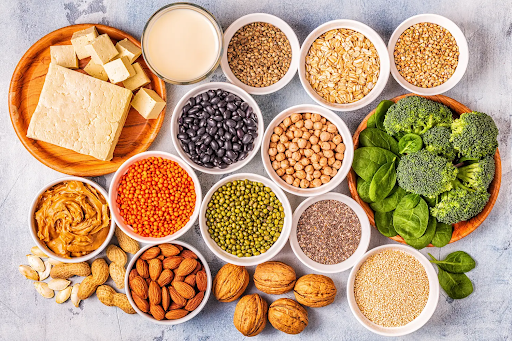Everything About Healthy And Balanced Food: Advantages of Embracing Plant Based Choices
The discussion surrounding plant-based diets has actually obtained substantial focus recently. Lots of individuals are exploring the potential wellness advantages, nutritional advantages, and environmental impacts linked with these dietary choices. As people come to be extra aware of their food's influence on well-being and sustainability, inquiries develop regarding the functionalities of adopting such a lifestyle. What particular changes can one expect, and just how might these choices improve not just personal wellness yet likewise the planet's future?
Recognizing Plant-Based Diet Plans
Numerous individuals connect plant-based diet regimens generally with vegetarianism or veganism, these diet plans can incorporate a large range of eating patterns that prioritize entire, minimally refined plant foods. Such diet plans frequently include fruits, vegetables, entire grains, nuts, seeds, and legumes, while getting rid of or restricting animal items. This versatility enables people to tailor their dietary selections according to personal choices and nutritional requirements. Some may take on a mainly plant-based diet regimen while still sometimes consuming meat or milk, frequently referred to as a flexitarian approach. The emphasis continues to be on incorporating more plant foods, which can bring about a diverse range of meals and tastes. Understanding these various analyses of plant-based eating is crucial for appreciating its ease of access and appeal in modern food culture.
Health Perks of Plant-Based Foods
The health and wellness benefits of plant-based foods are considerable, offering a nutrient thickness benefit that sustains total wellness. Study indicates that these foods can enhance heart health and wellness and play a vital duty in reliable weight management. By integrating a lot more plant-based alternatives, people might boost their nutritional choices and promote lasting wellness.
Nutrient Thickness Advantage
Nutrient density plays a vital role in the health and wellness benefits of plant-based foods, making them a compelling option for those looking for a balanced diet plan. Plant-based foods, such as fruits, vegetables, vegetables, nuts, and entire grains, are usually abundant in vital vitamins, minerals, and antioxidants while being reduced in calories. This high nutrient density enables individuals to eat fewer calories while still satisfying their nutritional needs. Additionally, these foods are packed with dietary fiber, promoting digestive health and assisting in weight monitoring. By incorporating nutrient-dense plant-based choices, consumers can enhance their overall health and wellness, sustain their immune systems, and lower the threat of persistent conditions. Eventually, the nutrient density of plant-based foods highlights their importance in a health-conscious lifestyle.
Heart Health And Wellness Improvement
:max_bytes(150000):strip_icc()/EWL-plant-based-foods-with-more-protein-than-an-egg-8424134-hero-3x2-42d27feb38e94570a6e5203bb0e4e666.jpg)
Weight Monitoring Assistance
Along with promoting heart wellness, a plant-based diet plan can considerably assist in weight monitoring. This dietary approach stresses whole foods such as fruits, vegetables, beans, nuts, and whole grains, which are generally reduced in calories and higher in fiber contrasted to animal-based products. The high fiber web content assists increase satiety, minimizing general calorie intake. Plant-based diets are usually rich in essential nutrients while low in harmful fats, making it less complicated to preserve a healthy and balanced weight. Research shows that individuals that embrace a plant-based way of living have a tendency to have reduced body mass indexes (BMIs) and experience even more successful fat burning compared to those that consume meat-heavy diet plans. Accepting plant-based alternatives is a calculated selection for effective weight management.
Nutritional Value of Plant-Based Ingredients
Plant-based active ingredients are abundant in important nutrients, using a varied selection of vitamins, minerals, and antioxidants that contribute to overall health and wellness. A contrast of protein resources discloses that while animal products are typically deemed superior, numerous plant-based choices supply appropriate healthy protein and various other helpful compounds. Understanding the nutritional worth of these ingredients can help individuals make informed nutritional selections.
Essential Nutrients in Plants
Nutrient-rich ingredients found in plants offer a varied selection of essential vitamins and minerals that contribute substantially to general wellness. These components are rich in vitamins A, C, and K, which support immune feature, vision, and blood clot, respectively. Furthermore, plants provide important minerals such as potassium, magnesium, and calcium, crucial for heart health and wellness, muscle feature, and bone toughness. The presence of fiber in plant-based foods help digestion and promotes a healthy and balanced digestive tract microbiome. Antioxidants, located abundantly in veggies and fruits, help fight oxidative stress and anxiety and decrease inflammation. Numerous plant foods are reduced in calories yet high in nutrients, making them an exceptional choice for those looking for to preserve a healthy and balanced weight while guaranteeing excellent nutrient intake.

Comparing Protein Resources
Healthy protein resources differ substantially in their dietary accounts, with plant-based active ingredients supplying one-of-a-kind benefits. Unlike animal healthy proteins, which often contain hydrogenated fats and cholesterol, plant healthy proteins often tend to be reduced in these harmful parts. Legumes, nuts, seeds, and entire grains are abundant in crucial amino acids, fiber, vitamins, and minerals. Lentils provide high healthy protein material along with considerable iron and folate, while quinoa is a complete protein, supplying all 9 important amino acids. Additionally, plant-based healthy proteins are commonly accompanied by anti-oxidants and phytochemicals that support total health and wellness. The shift to plant-based healthy protein sources not just enhances dietary intake yet likewise lines up with lasting dietary techniques, minimizing environmental influence and advertising long-term wellness benefits.
Environmental Impact of Plant-Based Consuming
As awareness of environment change grows, lots of individuals are discovering sustainable dietary selections that can substantially minimize their ecological footprint. Plant-based consuming has actually become a substantial contributor to minimizing greenhouse gas exhausts, which are mainly connected with animals production. The growing of fruits, veggies, grains, and legumes generally requires fewer resources, such as water and land, contrasted to pet farming. Additionally, plant-based diets can bring about decreased deforestation, as less land is needed for grazing animals or expanding animal feed. By moving towards plant-based choices, customers can support biodiversity and advertise much healthier ecological communities. Overall, welcoming plant-based consuming not just advantages personal wellness but also represents an essential step toward environmental sustainability and preservation initiatives.
Conquering Common Misconceptions
While numerous individuals recognize the advantages of a plant-based diet, several misconceptions usually hinder them from completely embracing this way of life. A common idea is that plant-based diets lack sufficient protein; nonetheless, numerous plant resources, such as legumes, nuts, and tofu, provide ample protein. In addition, some think that this diet regimen is pricey, when as a matter of fact, staples like beans, rice, and seasonal veggies can be quite cost effective. Another false impression is that plant-based consuming is excessively restrictive, whereas it in fact supplies a varied range of tastes and foods. Numerous stress that a plant-based diet might lead to shortages, yet with appropriate preparation, individuals can get all needed nutrients, including vitamins and minerals, while taking pleasure in a vast selection of scrumptious meals. Large Tips for Transitioning to a Plant-Based Way of life
Making the shift to a plant-based lifestyle can be an enhancing experience, though it typically requires some guidance to navigate the first changes. Initially, people are urged to begin progressively, including more fruits, vegetables, beans, and entire grains into their dishes while decreasing meat and dairy products usage. Dish preparation is necessary; preparing an once a week menu can help reduce the adjustment and protect against last-minute unhealthy selections. Checking out brand-new dishes and cooking approaches can additionally improve the experience and keep excitement concerning plant-based eating. Furthermore, joining support system or neighborhoods can supply inspiration and share beneficial tips. Remaining informed about nourishment warranties balanced dishes, protecting against shortages while promoting a healthy, gratifying plant-based way of living.

Delicious Plant-Based Meal Ideas
Exploring delicious plant-based dish ideas can inspire people to accept a much more nutritious diet regimen. One prominent option is a passionate quinoa salad, featuring cherry tomatoes, cucumber, and a tangy lemon-tahini dressing. Another fave is a full-flavored lentil stew, packed with carrots, celery, and fragrant herbs, best for a reassuring dinner. For morning meal, overnight oats made with almond milk, chia seeds, and topped with fresh berries provide a nourishing begin to the day. Additionally, a vibrant vegetable click this site stir-fry with tofu and a range of vibrant veggies can be a fast yet pleasing meal. Creamy avocado toast on whole-grain bread, sprayed with seasonings and seeds, uses a basic yet flavorful treat. These dishes display the variety and richness of plant-based eating.

Often Asked Questions
Can a Plant-Based Diet Offer Enough Healthy Protein?
The question of whether a plant-based diet plan can supply sufficient protein prevails. Countless sources, consisting of vegetables, nuts, seeds, and whole grains, can satisfy our website healthy protein requires efficiently, sustaining a nourishing and well balanced diet for people.
Are Plant-Based Diets Appropriate for Children?
The viability of plant-based diets for kids relies on careful planning. Sufficient nutrients need to be ensured, consisting of healthy proteins, vitamins, and minerals. With proper assistance, such diets can support healthy development and development in children.
How Do I Eat in restaurants on a Plant-Based Diet regimen?
Eating out on a plant-based diet regimen entails looking for dining establishments with varied food selections, asking for adjustments, and checking out vegan-friendly alternatives. Preparation ahead and communicating dietary choices can enhance the eating experience while maintaining nutritional options.
What Prevail Allergens in Plant-Based Foods?
Common allergens in plant-based foods include soy, gluten, nuts, and seeds - Gluten Free BBQ Sauce. Individuals complying with a plant-based diet regimen should understand these irritants and check out labels very carefully to prevent adverse reactions and guarantee safe consumption
Can Plant-Based Diets Assist With Fat Burning?
Study suggests that embracing a plant-based diet may facilitate fat burning as a result of its generally these details reduced calorie density and greater fiber material. This combination can enhance satiation, helping individuals manage their calorie intake properly. Numerous people connect plant-based diets generally with vegetarianism or veganism, these diet regimens can incorporate a large range of consuming patterns that prioritize whole, minimally processed plant foods. Nutrient thickness plays a vital function in the health benefits of plant-based foods, making them an engaging option for those looking for a well balanced diet. Plant-based diet regimens have actually been revealed to substantially enhance heart health and wellness, as they frequently include components that support cardiovascular function. In addition to promoting heart health and wellness, a plant-based diet regimen can substantially help in weight management. A common idea is that plant-based diet plans do not have sufficient healthy protein; nonetheless, countless plant sources, such as beans, nuts, and tofu, offer enough protein.